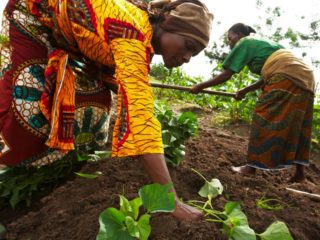Study reveals impact of recession on agriculture
A study conducted by Foundation
for Partnership Initiatives in the Niger Delta (PIND) and the UK Department for
International Development (DFID) Market Development (MADE Programme) has showed
that international development organisations as well as the Federal Government must
refocus their policies on agriculture to reshape their interventions in order to
mitigate the negative impact of Naira devaluation on growth in the sector.
Speaking at the presentation of
the findings in Abuja recently, Dara Akala, Executive Secretary of PIND, noted that
the study examined effects of devaluation and related government trade
restriction policies on four key agricultural value chains in the Niger Delta
region, namely cassava, palm oil, aquaculture, and poultry.
Akala said the study also looked
at the impact on agricultural inputs and leather goods as well as market
responses across the value chains to the income and substitution effects that
arose from the price shocks as a result of the devaluation and depreciation
policies.
Presenting his findings, the
consultant, who conducted the study, Ogho Okiti, said the government and its
partners must restructure their interventions to reflect the economic realities
of a dynamic situation, especially relating to the four key commodities in the
agricultural value chain.
"As the global crude oil
price fell from above $100 per barrel in early 2014 to below $30 per barrel by
the beginning of 2016, Nigeria's oil revenues and foreign exchange reserves
dropped. The decline in reserves exerted pressure on the Naira against the
dollar, and the Central Bank of Nigeria (CBN) was unable to defend the Naira's
peg to the dollar.
"To reduce imports and
conserve its diminishing foreign exchange reserves, the CBN devalued the Naira
twice between November 2014 and February 2015 and implemented a ban on access
to foreign exchange at the CBN official window for a list of 41 items,
including rice, poultry and palm oil products.
"The Federal Government
increased import levies on these goods and other agricultural products, and
even banned imports of some entirely. The impact of this devaluation and the
subsequent ban on importation differ from one agricultural value chain to
another," the report said.
Okiti said one of the findings
from the study was the impact of the devaluation on aquaculture, which resulted
in the rise in the price of catfish, as consumers turned to it as alternative
to more expensive imported fish and poultry, meaning increased revenues to
farmers.
Besides, he said Naira
devaluation made foreign feeds more expensive, creating opportunity for local
producers to strive to meet demand, while demand from the food sector more than
doubled the price of imported rice between 2015 and the beginning of 2017.
"The drop in rice import by
about two million tons since the devaluation led to higher demand of cassava
food products and cassava tubers.
The palm oil sub-sector also saw
increased demand for both Technical Palm oil, TPO, and Special Palm Oil, SPO,
as imports of refined palm oil were banned, while crude palm oil imports were
subjected to combined import tariffs of 35%, and exclusion from access to
official foreign exchange," the report said.
The report said the increase in
demand resulted in increased prices for palm oil, with producers and processors
of fresh palm fruit facing higher prices than when purchasing inputs.
The devaluation caused
significant price increases in the poultry value chain, with a drop in the
demand for preventive vaccines, as poultry farms adjusted to the increased cost
of production.
Consequently, PIND and MADE urged
government to adopt mechanized and commercialized agriculture methods, to
maximize the country's agricultural potentials, to earn foreign exchange from
exports, produce raw materials for the industries and create jobs for
unemployed youth.




Comments
Post a Comment